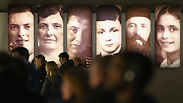
The ceremony took place in the presence of Polish Ambassador to Israel Jacek Hodorowicz, Jay and Amy Lakritz from the United States, who are children of the late Holocaust survivor Julia Lakritz, Sheldon Haber, the brother of the late Holocaust survivor, two great-granddaughters of the Righteous Among the Nations from Poland, Holocaust survivors, Members of the Commission for the Designation of the Righteous Among the Nations, family members and friends.
The Medal of Honor and certificate were presented by Dr. Ehud Loeb, a member of the Commission for the Designation of the Righteous Among the Nations and the Director of the Department of the Righteous Among the Nations at Yad Vashem.
Zurawska's story is one of self-sacrifice in the face of looming danger. On July 2, 1941, the Germans conquered the city of Sasow in Poland. Of the 1,500 Jews living in Sasow, most were murdered during the first year of the Nazi occupation. The remaining Jews were taken to a labor camp or to the ghetto in Zlochow.
In the summer of 1943, Helen Haber was warned by a labor camp guard of the upcoming liquidation of the camp. Helen managed to escape and join her mother Gittel and her daughter Julia Haber (later Lakritz) who had fled to the forests. Julia was just 5 years old, very sick and her body was covered with wounds.
Desperate and sick, in the summer of 1943 the three women came to the house of Maria Zurawska. Maria had been widowed only a year earlier after her husband Josef was killed along with four Jews who he had sheltered. Despite this fact, and despite remaining with five children, Maria agreed to hide the three Jewish fugitives in the bunker which had been made by her husband to hide Jews. Maria looked after Julia with devotion and love.
One day, Germans came to Maria's house looking for hidden Jews. Maria calmly explained to them that the Jews were at the end of the street and persuaded them to leave. Immediately after, Maria left her home with her children and the three hidden Jews in a horse and buggy. Together they moved to the village of Koltow, where Maria's parents lived. They remained there until the summer of 1944 when the area was liberated.
After the war, the Jewish survivors left Poland and traveled west where they settled in the Dominican Republic. They asked Maria to join them but she wanted to stay with her family. Over the years, the Lakritz family and Maria kept in touch by through written correspondence until her death in 1996.
Reprinted with permission from the Tazpit News Agency















